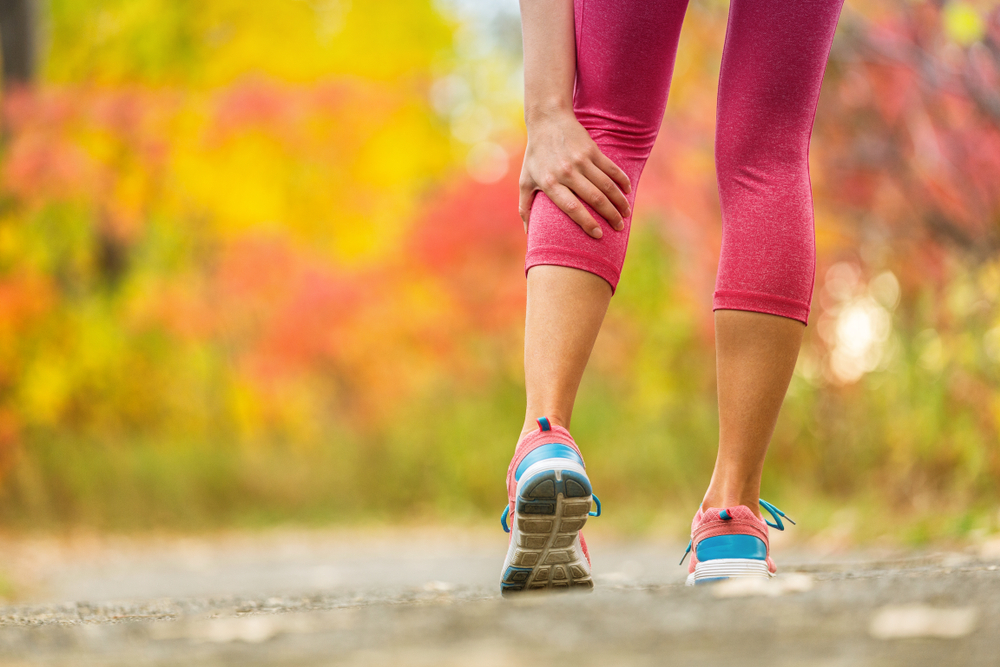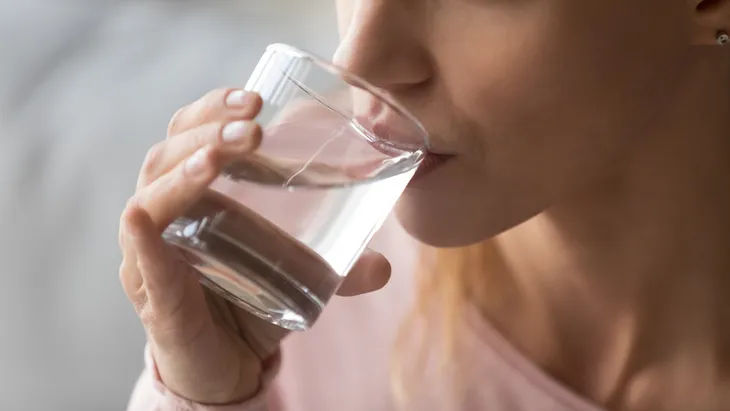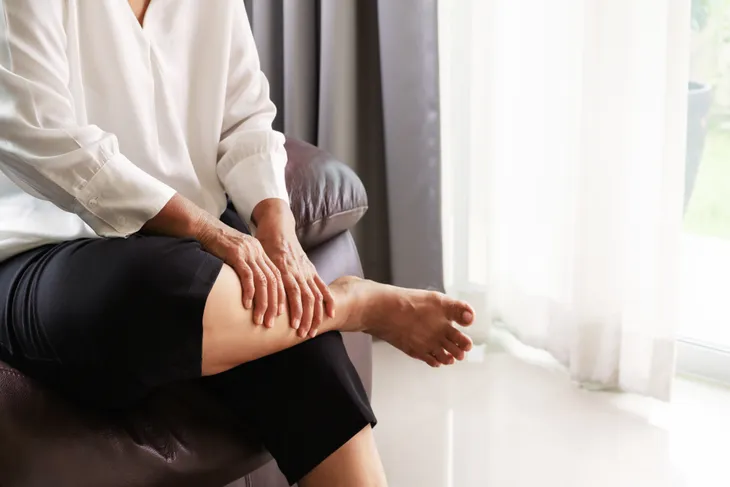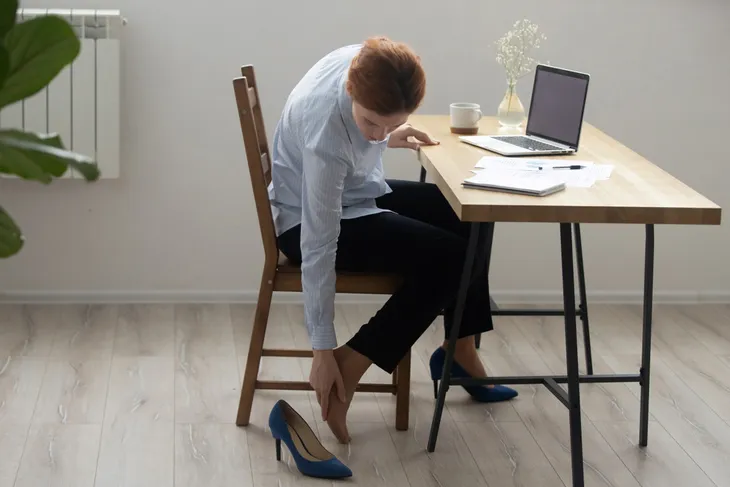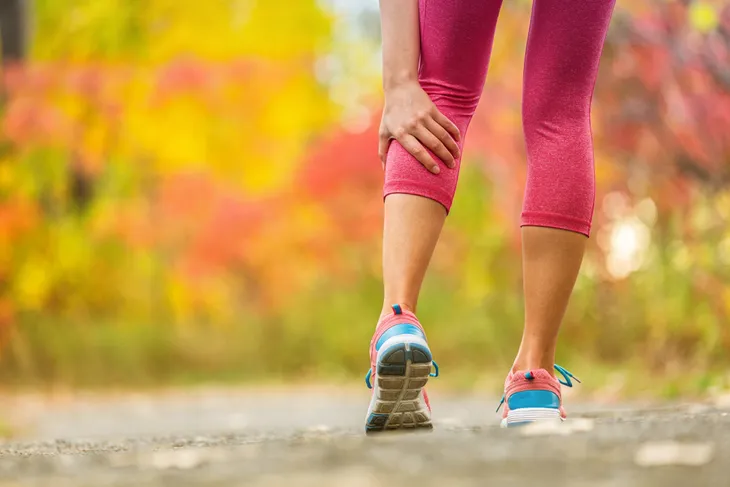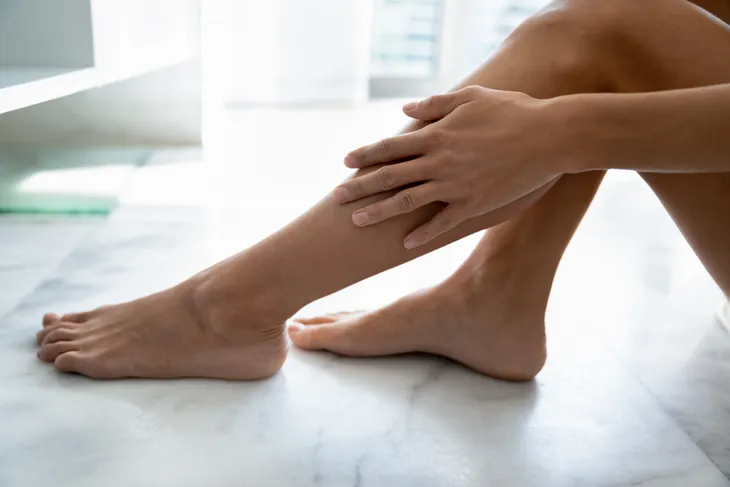Anyone who has experienced leg cramps knows how excruciating and annoying they can be. The worst part is they can happen at the worst possible moments like when you’re lying in bed at night or out for a jog. Muscle cramps are painful contractions (or tightening) of a muscle that can, unfortunately, come on suddenly. They can last anywhere from a couple of seconds to a few minutes.
Have you ever wondered why they happen? It turns out there are quite a few different causes, from dehydration and fatigue to varying diseases. Follow along as we explore what causes leg cramps and how to treat them!
Dehydration
A common cause of leg cramps is dehydration. “Athletes and avid exercisers deal with cramps all the time,” says Mark D. Peterson, Ph.D., research assistant professor in the department of physical medicine and rehabilitation at the University of Michigan Medical School, “especially during the summer months, in the heat without enough liquid.”
Muscle cells require enough water as well as essential minerals to allow the proteins within them to establish a proper contraction. With that in mind, make sure you drink plenty of liquids every day and especially when you’re working out. Fluids will help your muscles relax and contract.
Pregnancy
Leg cramps are quite common in pregnant women. In fact, almost half of all pregnant women will experience them. They’re more common during the second and third trimesters and happen most often at night.
While the cause of leg cramps during pregnancy isn’t known for sure, it may be caused by potassium and magnesium deficiencies. If you’re pregnant and experience leg cramps make sure you stay hydrated and speak to your doctor about taking a magnesium supplement.
Intense Exercises and Overuse
Changing up your workout routine can be a good thing but increasing the intensity of your workout too quickly may result in a leg cramp. “Whenever cramps are induced by starting or restarting an exercise, that’s usually an indication of ‘too much, too soon,” Dr. Miranda-Comas explains. “Your muscles don’t act and respond the same when you jog and sprint, for instance, so any increase in workout volume or intensity can trigger cramps.”
Furthermore, leg cramps can also be triggered by overusing the muscle. If you’re going for a longer run than usual you may experience cramping later on. This is often a result of over excited nerves. To prevent leg cramps from happening you may want to increase your workout intensity more slowly and make sure you rest and stretch before potentially overusing the muscle.
Mineral Deficiency
If you experience leg cramps often, there is a chance you may be deficient in an important mineral, magnesium. Healthline explains, “Magnesium is the fourth most abundant mineral in the body and is essential for regulating your body’s functioning. It’s involved in more than 300 of your body’s biochemical processes, including muscle contraction and nerve transmission.”
While the evidence that proves magnesium is effective for leg cramps is limited, it is still commonly used as a remedy. According to the National Institutes of Health (NIH), men over 70 and teenage girls and boys are the most likely groups of people to be deficient in magnesium. If you suspect you’re deficient, speak to your doctor and ask about taking a magnesium supplement.
Furthermore, another mineral deficiency that plays a role in muscle cramps is chronic low potassium. Potassium is an electrolyte that is necessary for the normal functioning of muscles, cells, and nerves. If you suspect this may be the cause, talk to your doctor about getting your potassium levels in your blood and urine measured.
Osteoarthritis
Osteoarthritis is the most common type of arthritis and it, unfortunately, affects more than 20 million people across America. There are several common identifiable symptoms of osteoarthritis such as loss of mobility, stiffness, and aching. But people may also experience muscle spasms and leg cramps too.
There is no cure for osteoarthritis but there are ways you can manage the pain. If you experience arthritis in the hip or knee make sure you perform exercises that strengthen the muscles of the upper leg. You may also want to check out these exercises that help manage osteoarthritis!
Fatigue
If you’re feeling fatigued, you may be more prone to leg cramps. Being overtired may cause you to forget to stay hydrated, or you may become less strict with your diet all of which can play a role in leg cramps.
Furthermore, Dr. Miranda-Comas says, “Physiologically, when the muscle is fatigued, it’s not as synchronized in using nutrients,” This means that tired muscles tend to lose more nutrients than they use which means they’re not functioning as well as they should. Fatigue may also even put you at risk for more nighttime leg cramps.
Sitting and Standing
Our muscles are designed to move, contract, and rest. If you’re doing more frequent sitting or standing than what your muscles are used to, you may experience leg cramping.
If you’re getting leg cramps from sitting too long you should get up and walk around for a few minutes for every hour you are seated. In contrast, if you’re standing too long be sure to sit for a few minutes for every hour you’re standing to help prevent leg cramps.
Poor Footwear
Wearing proper footwear is important for your feet, legs, and body. If you choose to wear improper footwear, you may be more susceptible to injuries such as ankle strains and fractures, bunions, and corns. But that’s not all, improper footwear can cause some other lesser-known injuries like metatarsalgia, which is a condition that causes pain in the ball of the foot.
Wearing the right footwear is also detrimental if you want to prevent leg and foot cramps. Uncomfortable shoes that are too tight, can constrict the muscles which lead to cramps. Make sure you research to find the proper footwear that is suited for your needs.
Medications
If you can’t find any obvious cause for your leg cramps you may want to take a look at your medication list. Several medications can cause muscle cramps such as diuretics that remove fluid from the body, Nifedipine which treats angina and high blood pressure, and Raloxifene which treats osteoporosis.
Other medications include Aricept for Alzheimer’s disease, Tasmar for Parkinson’s disease, asthma drugs that contain albuterol or terbutaline, and more. If you started experiencing frequent leg cramps around the same time you started a new medication you should talk with your doctor.
Remedies
Now that we’ve discussed some of the common causes of leg cramps let’s explore remedies that can help those dreadful leg cramps. We’ll go over some of the top prevention tips as well as what to do when you’re experiencing a leg cramp.
Stretching
The best thing you can do when you experience a leg cramp is stretch it out. First, make sure you stop whatever you are doing that induced the cramp in the first place. Next, stretch the muscle by straightening your leg and pull the top of your foot toward your head and hold the stretch.
You can also try putting your weight on the affected leg and then bend your knee slightly. Further, if you’re experiencing a cramp in the front of the thigh, hold onto a chair for balance and pull your foot back toward your buttock.
You may even want to try massaging the muscle while (or after) you stretch. Finally, another way to stretch the muscle is to walk around.
Apply Heat
Along with stretching, another great way to help treat a leg cramp is to apply heat. The reason heat helps is that it opens blood vessels which assist in the healing process and alleviates some of the pain.
Consider applying a heating pad or a hot wet cloth to the painful area. You may even want to consider taking a hot bath with Epsom salts to help soothe the pain.
Magnesium
As we discussed earlier, your leg cramps could be a sign of mineral deficiency. The good news is you can easily add more magnesium to your diet to reap its benefits.
Some of the best sources of magnesium include greens, nuts, seeds, and whole grains. You may even want to speak to your doctor about taking a magnesium supplement. For more ideas check out these magnesium-heavy foods you should be eating right now!
Hydrate
As we discussed earlier, dehydration is one of the leading causes of leg cramps. To prevent that from happening make sure you stay hydrated.
You can drink plain water, or if you want some flavor consider drinking lemon water. You can also drink sports drinks to ensure you’re getting enough electrolytes just be sure to watch out for the ones that are full of added sugar!
The U.S. National Academies of Sciences, Engineering, and Medicine states that adult men should consume about 3.7 liters (or 15.5 cups) of fluids per day while adult women should consume about 2.7 liters (11.5 cups) of fluids per day. It’s important to remember if you do any exercises that make you sweat you’ll need to drink extra water to cover the fluid loss.
 Getty Images
Getty Images